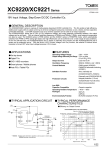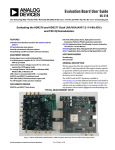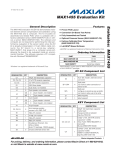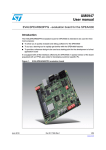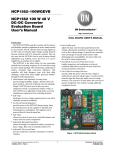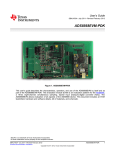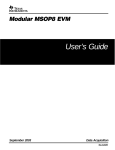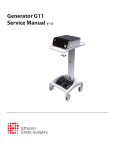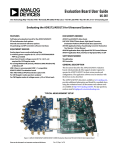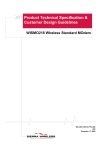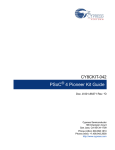Download Texas Instruments ADS5525 User's Manual
Transcript
ADS5525/27/45/46/47 EVM User Guide User's Guide November 2006 SLWU028B 2 SLWU028B – January 2006 – Revised November 2006 Submit Documentation Feedback Contents 1 Overview .................................................................................................................... 5 1.1 2 3 EVM Basic Functions ............................................................................................ 5 EVM Quick Start Guide ................................................................................................ 6 2.1 EVM LVDS Output Mode Quick Start (Default) .............................................................. 6 2.2 EVM CMOS Output Mode Quick Start ........................................................................ 6 Circuit Description ...................................................................................................... 7 3.1 Schematic Diagram .............................................................................................. 7 3.2 Circuit Function ................................................................................................... 7 4 Expansion Options .................................................................................................... 13 5 ........................................................................................... 13 4.2 Expansion Slot .................................................................................................. 13 4.3 Optional USB SPI Interface ................................................................................... 13 Physical Description .................................................................................................. 14 5.1 PCB Layout ...................................................................................................... 14 5.2 Bill of Materials .................................................................................................. 20 5.3 PCB Schematics ................................................................................................ 25 4.1 Custom FPGA Code SLWU028B – January 2006 – Revised November 2006 Submit Documentation Feedback Table of Contents 3 List of Figures 1 2 3 4 5 6 7 8 9 ADS5547 SNR Performance vs Decoupling ............................................................................. 8 THS4509 + ADS5545 EVM Performance ................................................................................ 9 Eye Diagram of Data on Header J4. ..................................................................................... 11 Top Layer.................................................................................................................... 14 Layer 2, Ground Plane .................................................................................................... 15 Layer 3, Power Plane #1 .................................................................................................. 16 Layer 4, Power Plane #2 .................................................................................................. 17 Layer 5, Ground Plane .................................................................................................... 18 Layer 6, Bottom Layer ..................................................................................................... 19 List of Tables 1 2 3 4 5 4 DIP Switch SW1 ............................................................................................................. 7 EVM Power Options ......................................................................................................... 8 Output Connector J4 ....................................................................................................... 10 Test Points .................................................................................................................. 12 Bill of Materials ............................................................................................................. 21 List of Figures SLWU028B – January 2006 – Revised November 2006 Submit Documentation Feedback User's Guide SLWU028B – January 2006 – Revised November 2006 1 Overview This manual assists users in using the ADS5525/27/45/46/47 evaluation module (EVM) for evaluating the performance of the ADS5525/27/45/46/47 (ADCs). The EVM provides a powerful and robust capability in evaluation of the many features of the ADCs and the performance of the device der many conditions. 1.1 EVM Basic Functions Analog input to the ADC is provided via external SMA connectors. The user supplies a single-ended input, which is converted into a differential signal. One input path uses a differential amplifier, while the other input is transformer-coupled. The EVM provides an external SMA connector for input of the ADC clock. The single-ended input is converted into a differential signal at the input of the device. Digital output from the EVM is via a 40-pin connector. Power connections to the EVM are via banana jack sockets. Separate sockets are provided for the ADC analog and digital supplies, the FPGA supply, and the differential amplifier supply. CAUTION Exceeding the maximum input voltages can damage EVM components. Undervoltage may cause improper operation of some or all of the EVM components. Xilinx, Spartan, WebPACK are trademarks of Xilinx, Inc. All other trademarks are the property of their respective owners. SLWU028B – January 2006 – Revised November 2006 Submit Documentation Feedback 5 www.ti.com EVM Quick Start Guide 2 EVM Quick Start Guide The ADC has two basic modes of output operation, ensuring compatibility in a broad range of systems. Follow the steps below to get the EVM operating quickly with the ADC in either DDR LVDS output mode or CMOS output mode. Note: 2.1 EVM LVDS Output Mode Quick Start (Default) 1. 2. 3. 4. 5. 6. 7. 8. 2.2 Ensure a jumper is installed between pins 1 and 2 on JP2. Ensure DIP switch SW1, switch 2 is set to LVDS. Ensure DIP switch SW1, switch 8 is set to PARALLEL. Use a regulated power supply to provide 3.3 VDC to the ADC at J11 and J15, with the corresponding returns connected to J9 and J16. Use a regulated power supply to provide a 5-VDC input to J14, while connecting the return to J17. Provide a filtered, low-phase-noise, sinusoidal 1.5-Vrms, 170-MHz clock to J7. Provide a filtered, sinusoidal analog input to J3. Using a logic analyzer and Table 3 in this manual, monitor the ADC output on J4. EVM CMOS Output Mode Quick Start 1. 2. 3. 4. 5. 6. 7. 8. 9. 6 Follow the steps in the listed order; not doing so could result in improper operation. Ensure a jumper is installed between pins 2 and 3 on JP2. Ensure DIP switch SW1, switch 2 is set to CMOS. Ensure DIP switch SW1, switch 8 is set to PARALLEL. Use a regulated power supply to provide 3.3 VDC to the ADC at J11 and J15, with the corresponding returns connected to J9 and J16. Use a regulated power supply to provide a 5-VDC input to J14, while connecting the return to J17. Provide a low-phase-noise, sinusoidal 1.5-Vrms, 170-MHz clock to J7. Provide a filtered sinusoidal analog input to J3. Briefly depress S1, which resets the EVM. Using a logic analyzer and Table 3 in this manual, monitor the ADC output on J4. SLWU028B – January 2006 – Revised November 2006 Submit Documentation Feedback www.ti.com Circuit Description 3 Circuit Description 3.1 Schematic Diagram The schematic diagram for the EVM is in Section 5.3 of this document. 3.2 Circuit Function The following paragraphs describe the function of individual circuits. See the data sheet for complete device operating characteristics. 3.2.1 Configuration Options The EVM provides a DIP switch, SW1, to control many of the modes of operation when the EVM is configured for parallel-mode operation. Table 1 describes the functionality of the DIP switches. Note: When the device is configured for serial-mode operation (SW1, switch 8), the DIP settings on SW1, switch 1 through SW1, switch 7 are ignored. Table 1. DIP Switch SW1 SW1 SWITCH NUMBER OFF ON 1 2s complement Offset binary Determines device output format Determines device output mode DESCRIPTION 2 LVDS CMOS 3 Reserved Reserved 4 Internal reference External reference 5 Edge = 1 Edge = 2 Allows for output edge programmability 6 Edge = 3 Edge = 4 Allows for output edge programmability 7 Normal Power down 8 Serial Parallel Reserved When set to External Reference, ADC uses common-mode voltage on TP1. Allows for power down Determines mode for register interface By switching SW1, switch 8 to OFF, the ADC operates in serial mode, using its programmed register contents. A complete register map can be found in the device datasheet. Three pins on header J6 have been reserved for programming the device while it operates in serial mode. To program the device registers using header J6, place SCLK on pin 21, SDATA on pin 23, and SEN on pin 25. A pattern generator can be used to generate the patterns needed for programming. Alternatively, TI provides an optional USB daughtercard that plugs into the expansion slot of the EVM. The USB daughtercard allows ADC register control via a software package loaded onto the PC. 3.2.2 Power Power is supplied to the EVM via banana jack sockets. The EVM offers the capability to supply analog and digital 3.3 V independently to the ADC. Table 2 offers a snapshot of the power-supply options. All supply connections are required for default operation, except J12, J10, J13, and J20. The EVM provides local decoupling for the ADC; however, the ADC features internal decoupling, and in many cases minimal external decoupling can be used without loss in performance. Users are encouraged to experiment to find the optimal amount of external decoupling required for their application. Figure 1 shows the ADS5547 LVDS-mode performance with all of the decoupling capacitors installed and the performance with C4, C5, C6, C7, C8, C9, and C10 removed. By default, the EVM comes with all of the decoupling capacitors installed. SLWU028B – January 2006 – Revised November 2006 Submit Documentation Feedback 7 www.ti.com Circuit Description Table 2. EVM Power Options BANANA JACK NAME VOLTAGE DESCRIPTION J9 Device AGND GND J10 AGND GND J11 Device AVDD 3.3 Device analog supply J12 Amplifier negative rail –5 THS4509 Vs– supply J13 Amplifier positive rail 5 THS4509 Vs+ supply J14 Auxiliary power 5 Supplies power to all peripheral circuitry including the FPGA and PROM. Voltages rails are created by using TI's TPS75003 voltage regulator. J15 Device DVDD 3.3 J16 DGND GND J17 DGND GND Device internal digital output supply J20 If TP11, TP12, and TP13 are tied low, the TPS75003 is disabled. In this case, one can supply 3.3 V to pin 1, 1.2 V to pin 2, and 2.2 V to pin 3 of J20 while connecting the ground to J17. 74 SNR − Signal-to-Noise Ratio − dBFS 1 Decoupling Cap 73 72 Baseline-All Decoupling Caps 71 70 69 68 9.97 19.94 30.13 40.33 50.13 60.13 69.59 79.87 89.75 100.33 130.13 170.13 fIN − Input Frequency − MHz G001 Figure 1. ADS5547 SNR Performance vs Decoupling 3.2.3 Analog Inputs The EVM can be configured to provide the ADC with either transformer-coupled or differential amplifier inputs from a single-ended source. The inputs are provided via SMA connector J3 for transformer-coupled input or SMA connector J1 for differential amplifier input. To set up for one of these options, the EVM must be configured as follows: 1. For a 1:1 transformer-coupled input to the ADC, a single-ended source is connected to J3. Confirm that SJP4 has pins 2 and 3 shorted, and that SJP5 has pins 2 and 3 shorted. The transformer used, the Mini-Circuits TC4-1W, forms an inherent band-pass filter with a pass band from 3 MHz to 800 MHz. This is the default configuration for the EVM. 2. One can use a TI THS4509 amplifier to drive the ADC by applying an input to J1. Reconfigure SJP4 and SJP5 such that both have pins 1 and 2 shorted. A 5-VDC supply must be connected to the board to provide power to U3 for this configuration. The THS4509 amplifier path converts a single-ended signal presented on J1 into a differential signal. 8 SLWU028B – January 2006 – Revised November 2006 Submit Documentation Feedback www.ti.com Circuit Description The schematics present various interface options between the amplifier and the ADC. Depending on the input frequencies of interest, further performance optimization can be had by designing a corresponding filter. In its default configuration, R43, R44, and C119 form a first-order, low-pass filter with a cutoff frequency of 70 MHz. Figure 2 shows the performance of the ADS5545 using the THS4509 path. 10 1 0 −10 −20 Amplitude − dBFS −30 −40 −50 −60 −70 −80 5 3 x −90 4 −100 2 −110 −120 −130 −135 0 5 10 15 20 25 30 35 40 45 50 55 60 65 70 75 80 85 f − Frequency − MHz G002 Figure 2. THS4509 + ADS5545 EVM Performance 3.2.4 Clock Input A single-ended, harmonically filtered, low-phase-noise, 1.5-Vrms sinusoidal input should be applied to J7. The frequency must not exceed the device specification. In the EVM default configuration, both SPJ1 and SJP2 must have pins 1 and 2 shorted. In the board default configuration, the transformer provides single-ended to differential conversion. The transformer has an impedance ratio of 4. 3.2.5 Digital Outputs For compatibility with a broad range of logic analyzers, the EVM outputs 3.3-V parallel CMOS data on header J4, independent of the ADC operational mode. The Xilinx™Spartan™-3E FPGA provides the necessary translation, and it configures itself using one of two different logic files stored in the PROM, based on the EVM configuration. The CMOS data output of the FPGA is contained in data header J4 and is a standard 40-pin header on a 100-mil grid, which allows easy connection to a logic analyzer. The connector pinout is listed in Table 3. For quick setup, the eye diagram is shown in Figure 3. No setup or hold-time adjustments must be made to the logic analyzer if using the rising edge of the output clock to latch in the data. Note: The eye diagram shown is the output of the FPGA at 210 MSPS, not that of the ADC. For the ADC output timing, see the respective device data sheet. SLWU028B – January 2006 – Revised November 2006 Submit Documentation Feedback 9 www.ti.com Circuit Description Table 3. Output Connector J4 J4 PIN 10 ADS5525/27 DESCRIPTION ADS5545/46/47 DESCRIPTION 1 CLK CLK 2 GND GND 3 NC NC 4 GND GND 5 Reserved Reserved 6 GND GND 7 Reserved Reserved 8 GND GND 9 NC Data bit 0 (LSB) 10 GND GND 11 NC Data bit 1 12 GND GND 13 Data bit 0 (LSB) Data bit 2 14 GND GND 15 Data bit 1 Data bit 3 16 GND GND 17 Data bit 2 Data bit 4 18 GND GND 19 Data bit 3 Data bit 5 20 GND GND 21 Data bit 4 Data bit 6 22 GND GND 23 Data bit 5 Data bit 7 24 GND GND 25 Data bit 6 Data bit 8 26 GND GND 27 Data bit 7 Data bit 9 28 GND GND 29 Data bit 8 Data bit 10 30 GND GND 31 Data bit 9 Data bit 11 32 GND GND 33 Data bit 10 Data bit 12 34 GND GND 35 Data bit 11 (MSB) Data bit 13 (MSB) 36 GND GND 37 NC NC 38 GND GND 39 NC NC 40 GND GND SLWU028B – January 2006 – Revised November 2006 Submit Documentation Feedback www.ti.com Circuit Description C001 Figure 3. Eye Diagram of Data on Header J4. 3.2.6 Test Points For added EVM visibility and control, several test points are provided. Table 4 summarizes the test points available. SLWU028B – January 2006 – Revised November 2006 Submit Documentation Feedback 11 www.ti.com Circuit Description Table 4. Test Points TP 3.2.7 DESCRIPTION TP1 ADC common mode, input or output depending on the setting of SW1, switch 4 TP3 THS4509 power down TP4 ADC output enable TP5 AGND TP6 AGND TP7 AGND TP8 DGND TP9 FPGA M0 pin; determines which FPGA logic file to load TP10 ADC SCLK TP11 TPS75003 1.2 enable TP12 TPS75003 2.5 enable TP13 TPS75003 3.3 enable LED Operation To give greater visibility into the EVM operations, two LEDs are provided, D3 and D4. On power up, D4 is asserted when a successful FPGA boot up is complete. For correct EVM operation, the LED should be asserted at all times. LED D3 is asserted when the ADC and FPGA are operating and decoding in DDR LVDS mode, and is not asserted when the ADC is functioning in CMOS mode. Furthermore, in either DDR LVDS mode or CMOS mode, LED D3 blinks when an ADC overrange condition occurs. CAUTION If LED D3 is blinking, the amplitude coming into the ADC input (J3 or J4) must be attenuated immediately; otherwise, damage to the ADC could occur. 12 SLWU028B – January 2006 – Revised November 2006 Submit Documentation Feedback www.ti.com Expansion Options 4 Expansion Options The EVM offers several exciting possibilities to expand the capabilities of the EVM. This allows the utmost flexibility when prototyping an ADC circuit under conditions that mimic the end system, without the need to develop a custom prototype board. 4.1 Custom FPGA Code Using a standard JTAG interface on JP1, users have the ability to load custom logic onto the FPGA, rapidly speeding up digital development time. This allows the flexibility of prototyping and debugging an ADC digital interface design before developing application-specific hardware. To take advantage of the onboard FPGA, users can download the free Xilinx WebPACK™ from the Xilinx Web site. Select the XC3S250E-4FT256 as the FPGA and the XCF16PFSG48 as the PROM. Note: See the Xilinx Spartan-3E Web site for complete documentation of the FPGA at: http://direct.xilinx.com/bvdocs/publications/ds312.pdf Schematically, the FPGA is configured in BPI mode, and it samples FPGA pins M2, M1, and M0 when the FPGA's INIT_B is brought low. Depending of the status of M0, it boots from either the top or the bottom of the PROM contents. The PROM allows for the storage of two FPGA bit files. In its default condition, the EVM stores one file for ADC CMOS output at the beginning of the PROM address space and one file for ADC LVDS output at the end of the PROM address space. Note: 4.2 When creating custom FPGA code, store any custom-developed bit files for ADC CMOS operation in the PROM revision 0 space, and store any custom-developed FPGA code for ADC LVDS operation in the PROM revision 1 space. Expansion Slot For those users who make use of a custom FPGA program on the EVM, J5 and J6 provide an expansion-slot capability. Users can design daughtercards or breakout boards to make use of the unused FPGA I/O pins which are brought out to the headers. Note: 4.3 The EVM provides 5 V from J14 to pin 1 of both J5 and J6. This can be used to provide power to any designed daughtercards. Optional USB SPI Interface In most cases, users can use the ADC parallel interface mode to change the operational modes of the ADC. For users requiring SPI control of the ADC, TI has developed an optional USB daughter card that plugs into the expansion slot. With the USB daughter card, users can use a PC interface to communicate to the ADC three-wire SPI interface, which allows for complete control of the ADC register map. Contact the factory for this optional accessory. SLWU028B – January 2006 – Revised November 2006 Submit Documentation Feedback 13 www.ti.com Physical Description 5 Physical Description This chapter describes the physical characteristics and PCB layout of the EVM. 5.1 PCB Layout The EVM is constructed on a 6-layer, 0.062-inch thick PCB using FR-4 material. The individual layers are shown in Figure 4 through Figure 9. The layout features split analog and digital ground planes; however, similar performance can be had with careful layout using a single ground plane. Users can connect the analog and digital ground planes underneath the EVM by soldering the two exposed tinned strips together. K001 Figure 4. Top Layer 14 SLWU028B – January 2006 – Revised November 2006 Submit Documentation Feedback www.ti.com Physical Description K002 Figure 5. Layer 2, Ground Plane SLWU028B – January 2006 – Revised November 2006 Submit Documentation Feedback 15 www.ti.com Physical Description K003 Figure 6. Layer 3, Power Plane #1 16 SLWU028B – January 2006 – Revised November 2006 Submit Documentation Feedback www.ti.com Physical Description K004 Figure 7. Layer 4, Power Plane #2 SLWU028B – January 2006 – Revised November 2006 Submit Documentation Feedback 17 www.ti.com Physical Description K005 Figure 8. Layer 5, Ground Plane 18 SLWU028B – January 2006 – Revised November 2006 Submit Documentation Feedback www.ti.com Physical Description K006 Figure 9. Layer 6, Bottom Layer SLWU028B – January 2006 – Revised November 2006 Submit Documentation Feedback 19 www.ti.com Physical Description 5.2 20 Bill of Materials SLWU028B – January 2006 – Revised November 2006 Submit Documentation Feedback www.ti.com Physical Description Table 5. Bill of Materials VALUE FOOTPRINT QTY PART NUMBER VENDOR DIGI-KEY NUMBER REF DESIGNATOR NOT INSTALLED CAPACITORS 47-µF, tantalum, 20%, 10-V 7343 4 ECS-T1AD476R Panasonic PCS2476CT-ND C65, C66, C68, C69 10-µF, 10-V, 20% 3528 5 ECS-T1AX106R Panasonic PCS2106CT-ND C70, C71, C72, C73, C74 10-µF, 10-V, 20% 3216 2 ECS-T1AY106R Panasonic P11309CT-ND C8, C9 100-µF, 6.3-V, 10% 6032 2 TPSC107K006R0150 AVX 478-1764-2-ND C35, C60 0.1-µF, 16-V, 10% 805 2 ECJ-2VB1C104K Panasonic PCC1812CT-ND C115, C116 2.2-µF, 6.3-V, 10% 805 1 ECJ-GVB0J225K Panasonic PCC2310CT-ND C117 10-µF, 6.3-V, 10% 805 4 GRM21BR60J106KE19L Murata 490-1717-1-ND C13, C30, C40, C41 0.01-µF, 16-V, 10% 603 1 ECJ-1VB1C103K Panasonic PCC1750CT-ND C57 0.1-µF, 16-V, 10% 603 18 ECJ-1VB1C104K Panasonic PCC1762CT-ND C14, C26, C33, C38, C62, 1.5-nF, 50-V, 10% 603 3 C1608X7R1H152K TDX 10-pF, 50-V, ±0.5-pF 603 1 ECJ-1VC1H100D Panasonic PCC100CVCT-ND C53 1-µF, 6.3-V, 10% 603 1 ECJ-1VB0J105K Panasonic PCC1915CT-ND C64 10-µF, 6.3-V, 20% 603 1 ECJ-1VB0J106M Panasonic PCC2395CT-ND C63 100-µF, 4-V, 20% 603 1 NOJC107M004RWJ AVX 478-1824-1-ND C61 2.2-µF, 6.3-V, 10% 603 13 ECJ-1VB0J225K Panasonic PCC2273CT-ND C85–C96, C114 18-pF, 50-V, 5% 603 1 GRM1885C1H180JA01D Murata 490-1409-1-ND C119 2-pF, 100-V, ±0.25-pF 603 0 GQM1885C2A2R0CB01D Murata 490-3555-1-ND 0.1-µF, 16-V, +80/–20% 402 14 ECJ-0EF1C104Z Panasonic PCC1731CT-ND C1, C3, C4, C5, C6, C7, C10, C11, C12, C16, C17, C19, C29, C44, C49 0.22-µF, 6.3-V , ±10% 402 17 ECJ-0EB0J224K Panasonic PCC2269CT-ND C42, C50, C76, C80, C84 0.022-µF, 6.3-V, +80/–20% 201 16 02016G223ZAT2A AVX 478-1054-1-ND C97, C98, C99, C100, C101, C102, C103, C104, C105, C106, C107, C108, C109, C110, C111, C112 SLWU028B – January 2006 – Revised November 2006 Submit Documentation Feedback C15, C18, C27, C28, C34, C36, C39, C51, C113 C25, C32, C37, C55, C52 C31, C58, C59 C2, C118 C20 C43, C54, C77, C81, C46, C67, C78, C82, C48, C75, C79, C83, 21 www.ti.com Physical Description Table 5. Bill of Materials (continued) VALUE FOOTPRINT QTY PART NUMBER VENDOR DIGI-KEY NUMBER REF DESIGNATOR ERJ-3GEY0R00V Panasonic P0.0GCT-ND R5, R6, R10, R18, R48, R58, R82 R11, C45, C47 NOT INSTALLED RESISTORS 0-Ω, 1/10-W, 5% 603 7 0-Ω, 1/10-W, 5% 402 3 ERJ-GE0R00X Panasonic P0.0JCT-ND 4.02-Ω, 1/10-W 1% 603 2 9C06031A4R02FGHFT Yageo 311-4.02HCT-ND 20-Ω, 1/16-W, 1% 603 1 ERJ-3EKF20R0V Panasonic P20.0HCT-ND R79 24.9-Ω, 1/16-W, 1% 603 1 ERJ-3EKF24R9V Panasonic P24.9HCT-ND R17 4.7-Ω, 1/2-W, 5% 603 2 ERD-S1TJ4R7V Panasonic P4.7BBCT-ND R44, R47 36-Ω, 1/10-W, 1% 603 0 RC0603FR-0736RL Yaego 311-36.0HRCT-ND 49.9-Ω, 1/16-W, 1% 603 2 ERJ-3EKF49R9V Panasonic P49.9HCT-ND R35, R36 100-Ω, 1/16-W, 0.1% 603 3 ERA-3YEB100V Panasonic P100YCT-ND R31, R41, R60 200-Ω, 1/16-W, 1% 603 2 ERJ-3EKF2000V Panasonic P200HCT-ND R15, R16 330-Ω, 1/16-W, 5% 603 3 ERA-V33J331V Panasonic P330CHCT-ND 499-Ω, 1/16-W, 1% 603 2 ERJ-3EKF4990V Panasonic P499HCT-ND 10-kΩ, 1/16-W, 1% 603 11 ERJ-3EKF1002V Panasonic P10.0KHCT-ND R2, R3, R4, R7, R8, R9, R26, R32, R33, R39, R40 4.75-kΩ, 1/16-W, 1% 603 2 ERJ-3EKF4751V Panasonic P4.75KHCT-ND R46, R49 15.4-kΩ, 1/16-W, 1% 603 1 ERJ-3EKF1542V Panasonic P15.4KHCT-ND R65 20-kΩ, 1/16-W, 1% 603 3 ERJ-3EKF2002V Panasonic P20.0KHCT-ND R30, R80, R81 36.5-kΩ, 1/16-W, 1% 603 1 ERJ-3EKF3652V Panasonic P36.5KHCT-ND R66 56.2-kΩ, 1/16-W, 1% 603 1 ERJ-3EKF5622V Panasonic P56.2KHCT-ND R1 4.99-kΩ, 1/16-W, 1% 603 3 ERJ-3EKF4991V Panasonic P4.99KHCT-ND R27, R28, R29 61.9-kΩ, 1/16-W, 1% 603 2 ERJ-3EKF6192V Panasonic P61.9KHCT-ND R63, R64 0.033-Ω, 1/4-W, 5% 805 2 RL1220T-R033-J Susumu Co,. Ltd. RL12T.033JCT-ND R61, R62 348-Ω, 1/16-W, 1% 402 2 ERJ-2RKF3480X Panasonic P348LCT-ND R24, R25 49.9-Ω, 1/16-W, 1% 402 3 ERJ-2RKF49R9X Panasonic P49.9LCT-ND R19, R42, R43 78.7-Ω, 1/16-W, 1% 402 2 ERJ-2RKF78R7X Panasonic P78.7LCT-ND R20, R21 100-Ω, 1/16-W, 1% 402 2 ERJ-2RKF1000X Panasonic P100LCT-ND R22, R23 20-Ω R-pack, 5%, 0.063-W CTS-742_8RES 2 742C163220JTR CTS 742C163220JCT-ND RP1, RP2 10-kΩ resistor pack CTS_742_8RES 1 742C163103JTR CTS 742C163103JCT-ND RP3 22 R54, R56 R37, R38 R12, R13 R34, R59 R85, R86 R45, R87, R88 R83, R84 SLWU028B – January 2006 – Revised November 2006 Submit Documentation Feedback www.ti.com Physical Description Table 5. Bill of Materials (continued) VALUE FOOTPRINT QTY PART NUMBER VENDOR DIGI-KEY NUMBER REF DESIGNATOR NOT INSTALLED FERRITE BEADS, CONNECTORS, JUMPERS, JACKS, ICs, ETC. Ferrite bead 1206 5 Inductor, SMT, 15-µH, 2.6-A COIL-CDRH8D43 Inductor, SMT, 5-µH, 2.9-A COIL-CDRH6D38 0.0-Ω, 1/8-W, 5% resistor EXC-ML32A680U Panasonic P10437CT-ND 1 CDRH8D43-150 Sumida 1 CDRH6D38-5R0 Sumida CDRH6D38-5R0NC-ND FB2, FB3, FB4, FB6, FB7 L1 L2 805 2 ERJ-6GEY0R00V Panasonic P0.0ACT-ND Red test point Test_point2 8 5000k Keystone 5000K-ND TP1, TP4, TP9, TP10 Black test point Test_point2 4 5001k Keystone 5000K-ND TP5 TP6 TP7 TP8 20×2×.1 1 HTSW-120-07-L-D Samtec J4 40-pin header smt 20X2_SMT_MMS_ SAMTEC 2 MMS-120-02-T-DV Samtec J5, J6 Red banana jacks BANANA_JACK 5 ST-351A Allied N/A J11, J12, J13, J14, J15 Black banana jacks BANANA_JACK 4 ST-351B Allied N/A J9, J10, J16, J17 ARFX1231-ND 40-pin header SMA connectors 3POS_header 6-pin header L3, L4 SMA_Jack 3 901-144-8RFX AMP 3pos_jumper 1 HTSW-150-07-L-S Samtec JP2 (1) JP1 6×1×.1 1 HTSW-120-07-L-D Samtec 3-pin power connector 3term_screw_con 0 93F7124 Newark Transformer TC4-1W_ TRANSFORMER 3 TC4-1W Mini-Circuits Diode, Schottky, 1-A, 20-V DIODE-MBRM120 1 MBRM120E ON Semiconductor Diode, Schottky, 3-A, 20-V J1, J3, J7 D2 1 SS32 Vishay LED-1206 2 CMD15-21VGC/TR8 Panasonic MOSFET, P-CH, 20-V, 4.7-A, 39-MΩ 3-SOT-23 2 SI2323DS Vishay TRANS BIAS NPN, 50-V SOT416 1 DTC114EET1 ON Semiconductor DTC114EET1OS-ND Q3 Switch EVQ-PJ 1 EVQ-PJX04M Panasonic P8050SCT-ND S1 Switch, 8-Pos, half-pitch SMT SWITCH_8POS_ SMT 1 TDA08H0SK1 ITT CKN1365-ND SW1 3-circuit jumpers SJP3_RESISTOR 2 ERJ-3GEY0R00V Panasonic P0.0GCT-ND SJP4 (2), SJP5 (3) 3-circuit jumpers SJP3_402 2 ERJ-2GE0R00X Panasonic P0.0JCT-ND SJP1 (4), SJP2 (5) (use a 0-Ω resistor (use a 0-Ω resistor (use a 0-Ω resistor (use a 0-Ω resistor SLWU028B – January 2006 – Revised November 2006 Submit Documentation Feedback to to to to short short short short J8 T1, T2, T3 DO-214AB(SMC) Add jumper for JP2 between pins 1 to 2. Add jumper for SJP4 between pins 2 and 3 Add jumper for SJP5 between pins 2 and 3 Add jumper for SJP1 between pins 1 and 2 Add jumper for SJP2 between pins 1 and 2 TP3 TP11 TP12 TP13 J20 Green SM_LED_1206 (1) (2) (3) (4) (5) FB8, FB9, FB10 D1 L62205CT-ND D3, D4 Q1, Q2 pins). pins). pins). pins). 23 www.ti.com Physical Description Table 5. Bill of Materials (continued) VALUE FOOTPRINT ADS5525/27, ADS5545/46/47 48-QFN_MOD Spartan-3E XC3S250E 256-BGA1mm_XILINX IC amp, fully-diff, wideband 16-QFN(RGT) 1 XCF16PFSG48 QTY 1 PART NUMBER VENDOR DIGI-KEY NUMBER ADS5525/27, ADS5545/46/47 TI U1 XC3S250E-4FT256CES Xilinx U2 THS4509RGTT TI 296-17730-1-ND REF DESIGNATOR U3 48PIN_BGA_XILINX 1 XCF16PFSG48 Xilinx IC, pwr-mgmt, triple-supply 20-pin-QFN 1 TPS75003RHLR TI 296-17835-2-ND U6 IC, LDO reg, hi-PSRR, 1.8-V 5-SOT(DBV) 1 TPS73018DBVT TI 296-17577-1-ND U7 IC, comparator, R-R, hi-spd 8-TSSOP(DCN) 1 TLV3502AIDCNT TI 296-18147-2-ND U9 5-SOT(DBV) 1 SN74LVC1G86DBVR TI 296-9853-1-ND U10 Shorting jumper 1 N/A 3M 929955-06-ND Screw 4-40 × 3/8" 4 N/A Building Fasteners H781-ND Standoff, hex (1/4 x .5") 4-40 screw 4 N/A Keystone 1902CK-ND IC, EX-OR gate, 2-in 2-pos shunt 24 NOT INSTALLED U4 SLWU028B – January 2006 – Revised November 2006 Submit Documentation Feedback www.ti.com Physical Description 5.3 PCB Schematics The schematics for the EVM are on the following pages. SLWU028B – January 2006 – Revised November 2006 Submit Documentation Feedback 25 U2A XILINX XC3S500E_FT256 DRVDD D C3 C1 .1uF .1uF + C8 10uF CLKOUTM CLKOUTP AVDD + C9 C4 C5 C6 C7 C10 C19 10uF .1uF .1uF .1uF .1uF .1uF .1uF D12_D13P D12_D13M A9 A10 D10_D11P D10_D11M D8_D9P D8_D9M D6_D7P D6_D7M D4_D5P D4_D5M B8 A8 D8 C8 D7 E7 D6 C6 E6 D5 A4 A5 C4 C5 B3 C3 A3 C13 C12 D12 C9 C10 D2_D3P D2_D3M U1-H6 (Sh 4) U1-H5 U1-H6 U1-H5 3.3V R3 R27 R30 10K 4.99K 20K (Sh 4) DFS DFS (Sh 4) (Sh 4) OE CLKP CLKM OVR CLKOUTM CLKOUTP R10 OE 0 TP4 CLKP CLKM DRGND DRVDD OVR CLKOUTM CLKOUTP DFS OE AVDD AGND CLKP CLKPM AGND U1 ADS5545_48PIN-QFN DRGND DRVDD D0_D1P D0_D1M N/C N/C RESET SCLK SDATA SEN AVDD AGND 36 35 34 33 32 31 30 29 28 27 26 25 A7 A12 B4 B6 B10 TP10 D0_D1P D0_D1M D9 R41 R48 R6 100 RESET SCLK SDATA 0 0 R18 0 S1 CM AGND INP INM AGND AVDD AGND AVDD IREF AVDD MODE AVDD (Sh 4) (Sh 4) OVR 1 2 3 4 5 6 7 8 9 10 11 12 D12_D13P D12_D13M D10_D11P D10_D11M D8_D9P D8_D9M D6_D7P D6_D7M D4_D5P D4_D5M D2_D3P D2_D3M 48 47 46 45 44 43 42 41 40 39 38 37 C (Sh 4) RESET SCLK SDATA (Sh 4) (Sh 4) (Sh 4) R81 R29 R7 20K 4.99K 10K 1 JP2 (1-2) 3.3V D IP_L10N_0/GCLK9 IP_L10P_0/GCLK8 IO_L11N_0/GCLK11 IO_L11P_0/GCLK10 IO_L14N_0/VREF_0 IO_L14P_0 IO_L15N_0 IO_L15P_0 IP_L16N_0 IP_L16P_0 IO_L17N_0/VREF_0 IO_L17P_0 IO_L18N_0 IO_L18P_0 IO_L19N_0/HSWAP IO_L19P_0 IP IP IP_L02N_0 IP_L02P_0 IP_L07N_0 IP_L07P_0 NC NC GND GND GND GND GND GND GND IO IO IO IP IP C7 B7 C A1 B9 F6 G7 G8 G9 H8 IO_VREF_0 U1-G2 (Sh 4) U1-G3 (Sh 4) SEN (Sh 4) DRVDD SW-PB SEN R2 10K 13 14 15 16 17 18 19 20 21 22 23 24 VCCO_0 B5 B12 F7 F10 2 IO_L09N_0/GCLK7 IO_L09P_0/GCLK6 U1-G3 3.3V 2.5V VCCO_0 VCCO_0 VCCO_0 VCCO_0 IO_L04P_0 IO_L05N_0/VREF_0 IO_L05P_0 IO_L06N_0 IO_L06P_0 IO_L12N_0 IO_L12P_0 IO_L08N_0/GCLK5 IO_L08P_0/GCLK4 U1-G2 U1-H4 B IO_L01N_0 IO_L01P_0 IO_L03N_0/VREF_0 IO_L03P_0 2.5V IO_L04N_0 3 A14 B14 A13 B13 E11 D11 B11 C11 E10 D10 F8 E8 F9 E9 U1-H3 3.3V DRVDD R80 R28 R4 20K 4.99K 10K U1-H4 (Sh 4) U1-H3 (Sh 4) MODE (Sh 4) B TP1 (Sh 2) VCM R32 DFS 3.3V 10K (Sh 2) 3.3V CM VCM R5 0 MODE CM C14 10K 2 3 4 2.2uF +IN A V+ -IN A OUT A +IN B OUT B -IN B V- 8 7 10K A 56.2K TP9 U10 1 4 6 R1 .1uF 2 SN74LVC1G86 5 3 R39 .1uF IREF C116 5 1 C117 .1uF U9 TLV3502 R33 C115 M0 M0 (Sh 4) (Sh 2) INP (Sh 2) INM INP INM ti R40 10K A 12500 TI Boulevard. Dallas, Texas 75243 Title: Engineer: Note 1. Part not installed Drawn By: FILE: J. VENABLE Y. DEWONCK SIZE: ADS5545 DATE: 11-Jul-2006 REV: B 1 SHEET: OF: 7 1 2 3 4 5 6 +VCC AMPLIFIER PATH: C11 C12 .1uF .1uF C13 C40 10uF AC Couple (default) 10uF C45 C47 = 0.1uF R26 R27 = 200 Ohms R5 = 0 Ohms VCC= 5 V, VEE = GND R24 348 D D TP3 DC Couple .1uF VCM 7 8 R44 L3 49.9 R85 0 ohm Vs+ Vs+ 0 ohm C2 4.7 200 20pF C47 Vin+ Vout- R43 10 CM C119 CM L4 49.9 C118 0 ohm 0 ohm CM C49 20pF R86 R47 20pF 200 AMP_M 4.7 16 499 15 R21 14 R84 .1uF 9 .1uF R42 THS4509 4 C16 U3 Vin- 11 VCM AMP_P C45 3 Vs- 499 Vout+ Vs- R83 69.8 N/C 2 Vs- R20 Vs+ PD 5 4 3 2 1 Vs+ 100 (Sh 1) C45 C47 = 0 Ohms R26 R27 = Unpopulated R5 = Unpopulated VCC= 4 V, VEE = -1V R22 Vs- C44 13 1 6 12 SMA_END 5 J1 69.8 C R23 R25 100 348 C -VCC R19 49.9 C46 C17 C29 C30 C41 .1uF .1uF 10uF 10uF .22uF Note : R12, C20, and R13 are to be un-populated on ADS5525/45/46 EVMs. 24.9 R12, C20, and R13 may be populated for future ADC boards; contact factory for details. AMP_M CM CM B 1 R17 B SJP4 R37 2 INM (Sh 1) 4.02 (2-3) R12 36 3 J3 AIN INM C15 5 4 3 2 1 4 T1 R34 49.9 (Note 1) 3 1 2 6 R15 R16 200 200 1 T2 6 .1uF 2 C113 3 TC4-1W R35 R36 49.9 49.9 C52 C20 2pF .1uF (Note 1) 4 TC4-1W AMP_P .1uF R13 36 1 C55 C62 C51 .1uF .1uF SJP5 2 .1uF INP INP (Sh 1) 4.02 3 (2-3) R38 ti A A 12500 TI Boulevard. Dallas, Texas 75243 Title: Engineer: Note 1. Part not1installed 2 3 4 5 Drawn By: FILE: J. VENABLE Y. DEWONCK ADS5545 DOCUMENTCONTROL # REV: 6 DATE: 17-Jul-2006 SIZE: SHEET: 2 OF: B 7 1 2 3 4 5 6 D D 1 (Note 1) J7 CLK_INP R54 2 0 C25 6 T3 1 5 4 3 2 R59 2 49.9 (Note 1) 4 100 .1uF SJP2 3 2 CLKP CLKP (Sh 1) 0 C26 .1uF 3 (1-2) R56 1 (Note 1) 1 R58 5 4 3 2 R31 100 TC4-1W J8 CLK_INM (Note 1) R60 1 1 0 2 SJP1 CLKM CLKM (Sh 1) 3 (1-2) C C B B ti A A 12500 TI Boulevard. Dallas, Texas 75243 Title: Note 1. Part not installed Engineer: J. VENABLE Drawn By: Y. DEWONCK FILE: 1 2 3 4 5 ADS5545 DOCUMENTCONTROL # DATE: 11-Jul-2006 SIZE: 6 SHEET: 3 REV: B OF: 7 1 2 3 4 5 U2B XILINX XC3S500E_FT256 5V J5 J4 2 4 6 8 10 12 14 16 18 20 22 24 26 28 30 32 34 36 38 40 D R79 1 3 5 7 9 11 13 15 17 19 21 23 25 27 29 31 33 35 37 39 CLKOUT 20 RP1 20 Ohm 1 2 3 4 5 6 7 8 1 2 3 4 5 6 7 8 16 15 14 13 12 11 10 9 16 15 14 13 12 11 10 9 2 4 6 8 10 12 14 16 18 20 22 24 26 28 30 32 34 36 38 40 ADC_D0 ADC_D1 ADC_D2 ADC_D3 ADC_D4 ADC_D5 ADC_D6 ADC_D7 ADC_D8 ADC_D9 ADC_D10 ADC_D11 ADC_D12 ADC_D13 ADC_D14 ADC_D15 RP2 20 Ohm 40PIN_IDC 1 3 5 7 9 11 13 15 17 19 21 23 25 27 29 31 33 35 37 39 (Sh 5) IO/HDC CTRL_LE CTRL_DATA CTRL_CLK C U2C XILINX XC3S500E_FT256 3.3V M7 T12 T8 T10 P13 R4 (Sh 5) (Sh 5) BUSY INIT_B R9 T9 N5 P5 P4 P3 R3 T3 T5 T4 N6 M6 P6 R6 T7 R7 N9 P9 P11 R11 N12 P12 R13 T13 L8 M8 P8 N8 M9 L9 M10 N10 N11 M11 R14 P14 BUSY INIT_B ADC_D7 ADC_D8 ADC_D9 ADC_D10 ADC_D13 ADC_D12 ADC_D11 B (Sh 1) (Sh 5) (Sh 5) (Sh 5) A M0 CCLK A23 D0 D1 D2 D3 D4 D5 D6 D7 SW16 SW15 SW14 SW13 SW12 SW9 IO/HDC SW10 SW11 40PIN SMT MMS 40PIN_IDC M0 ADC_D14 ADC_D15 CCLK A23 D0 D1 D2 D3 D4 D5 D6 D7 T2 T14 IP IP IO/D5 IO/M1 (Sh 1) OE (Sh 1) OVR OE (Sh 1) DFS R15 R16 P15 P16 M16 N16 L15 L14 J16 K16 H14 H15 G16 G15 F15 F14 D14 D15 C15 C16 K12 K13 K14 K15 J13 J14 H11 H12 G14 G13 F12 F13 IO_L01N_1/A15 VCCO_1 IO_L01P_1/A16 VCCO_1 IO_L02N_1/A13 VCCO_1 IO_L02P_1/A14 VCCO_1 IO_L04N_1/VREF_1 IO_L04P_1 IO_L06N_1 IO_L06P_1 IO_L09N_1/A9/RHCLK1 IO_L09P_1/A10/RHCLK0 IO_L11N_1/A5/RHCLK5 IO_L11P_1/A6/RHCLK4/IRDY1 IO_L13N_1/A1 IO_L13P_1/A2 IO_L15N_1 IO_L15P_1 IO_L18N_1/LDC0 IO_L18P_1/HDC IO_L19N_1/LDC2 IO_L19P_1/LDC1 IO_L07N_1/A11 IO_L07P_1/A12 NC IO_L08N_1/VREF_1 NC IO_L08P_1 NC IO_L10N_1/A7/RHCLK3/TRDY1 NC IO_L10P_1/A8/RHCLK2 NC IO_L12N_1/A3/RHCLK7 NC IO_L12P_1/A4/RHCLK6 IO_L14N_1/A0 IO_L14P_1 IO_L16N_1 IO_L16P_1 B16 E14 G12 H16 J11 J12 M13 OVR D3 LED_1206 L7 L10 R5 R12 IO/VREF_2 IO/VREF_2 IP_L11N_2/M2/GCLK1 IP_L11P_2/RDWR_B/GCLK0 IO/L03N_2/MOSI/CSI_B IO/L03P_2/DOUT/BUSY IO/L01N_2/INIT_B IO/L01P_2/CSO_B IP_L02N_2 IP_L02P_2 IO/L04N_2 IO/L04P_2 IO/L05N_2 IO/L05P_2 IO/L06N_2 IO/L06P_2 IP_L08N_2/VREF_2 IP_L08P_2 IO/L12N_2/D1/GCLK3 IO/L12P_2/D2/GCLK2 IO/L16N_2/A22 IO/L16P_2/A23 IO/L18N_2/A20 IO/L18P_2/A21 IO/L19N_2/VS1/A18 IO/L19P_2/VS2/A19 IO/L09N_2/D6/GCLK13 IO/L09P_2/D7/GCLK12 IO/L10N_2/D3/GCLK15 IO/L10P_2/D4/GCLK14 IO/L13N_2/DIN/D0 IO/L13P_2/M0 IO/L15N_2 IO/L15P_2 IP_L17P_2 IP_L17N_2 IO/L20N_2/CCLK IO/L20P_2/VS0/A17 CTRL_LE CTRL_DATA CTRL_CLK 3.3V VCCO_2 VCCO_2 VCCO_2 VCCO_2 J6 3.3V 6 5V IP IP IP IP IP IP IP M14 D16 H13 DFS GND GND GND GND GND GND GND GND IO IO/VREF_1 IP/VREF_1 E15 G11 K11 M15 2 4 6 8 10 12 14 16 18 20 22 24 26 28 30 32 34 36 38 40 1 3 5 7 9 11 13 15 17 19 21 23 25 27 29 31 33 35 37 39 U2D XILINX XC3S500E_FT256 ADC_D6 ADC_D5 ADC_D4 ADC_D3 ADC_D2 ADC_D1 N15 N14 L13 L12 E16 E13 (Sh 1) MODE (Sh 1) U1-G2 (Sh 1) U1-G3 (Sh 1) U1-H6 (Sh 1) U1-H5 (Sh 1) U1-H4 (Sh 1) U1-H3 (Sh 1) RESET (Sh 1) A16 F11 G10 H9 H10 J9 J10 J15 SCLK (Sh 1) SDATA (Sh 1) SEN R1 R2 P1 P2 N1 M1 L5 K5 ADC_D0 K1 J1 E1 D1 E4 E3 C2 C1 B2 B1 G4 MODE G5 U1-G2 G2 U1-G3 G3 U1-H6 H6 U1-H5 H5 U1-H4 H4 U1-H3 H3 RESET J3 CLKOUT J2 SCLK J4 J5 SDATA K2 SEN K3 D2 F2 H1 J6 K4 M3 N3 R87 330 F5 G1 N2 NC NC NC NC IP IP IP IP IP IP IP IO C H2 H7 J7 J8 K7 L6 T1 P7 N7 P10 R10 RP3 10K Ohm 1 2 3 4 5 6 7 8 SW1 3.3V GND GND GND GND GND GND K8 K9 K10 L11 R8 T16 IP IP B 16 15 14 13 12 11 10 9 16 1 SW16 15 2 SW15 14 3 SW14 13 4 SW13 12 5 SW12 11 6 SW11 10 7 SW10 9 8 SW9 ti Note 1. Part not installed Drawn By: FILE: 3 4 A 12500 TI Boulevard. Dallas, Texas 75243 Title: Engineer: 2 D F4 F3 L2 L3 L4 M4 GND GND GND GND GND GND GND IP/VREF_3 IO/VREF_3 SWITCH_8POS_SMT 1 3.3V E2 G6 K6 M2 IO_L19N_3 VCCO_3 IO_L19P_3 VCCO_3 IO_L18N_3 VCCO_3 IO_L18P_3 VCCO_3 IO_L16N_3 IO_L16P_3 IO_L15N_3 IO_L15P_3 IO_L12N_3 IO_L12P_3 IO_L05N_3 IO_L05P_3 IO_L03N_3 IO_L03P_3 IO_L02N_3/VREF_3 IO_L02P_3 IO_L01N_3 IO_L01P_3 IO_L06N_3 IO_L06P_3 IO_L07N_3 NC IO_L07P_3 NC IO_L08N_3/LHCLK1 NC IO_L08P_3/LHCLK0 NC IO_L09N_3/LHCLK3/IRDY2 NC IO_L09P_3/LHCLK2 NC IO_L10N_3/LHCLK5 IO_L10P_3/LHCLK4/TRDY2 IO_L11N_3/LHCLK7 IO_L11P_3/LHCLK6 IO_L13P_3 IO_L13N_3 5 J. VENABLE Y. DEWONCK ADS5545 DOCUMENTCONTROL # DATE: 11-Jul-2006 REV: SIZE: 6 SHEET: 4 OF: B 7 1 2 3 4 R88 2.5V 5 6 3.3V 330 D4 LED_1206 R49 4.75K VCCINT VCCINT VCCINT 3.3V OE/RESET__ CLK CE__ BUSY CLKOUT B2 C6 D6 G5 H2 A4 C3 C4 D3 D4 E3 E4 F2 F3 F4 G2 A1 A2 B6 F1 F5 F6 H1 (Sh 3) D Q3 VCCO VCCO VCCO VCCO VCCJ D0 D1 D2 D3 D4 D5 D6 D7 CF__ DNC DNC DNC DNC DNC DNC DNC DNC DNC DNC DNC GND GND GND GND GND GND GND CEO__ TMS TDO TDI REV_SEL0 REV_SEL1 TCK EN_EXT_SEL__ A3 INIT_B B3 B4 C1 BUSY CCLK INIT_B CCLK (Sh 4) BUSY (Sh 4) DTC114EET1 (Sh 4) R46 R45 330 U2E XILINX XC3S500E_FT256 4.75K DONE PROG_B C2 H6 H5 E5 D5 C5 B5 A5 A6 D0 D1 D2 D3 D4 D5 D6 D7 D1 IO/HDC T15 D3 A15 D0 D1 D2 D3 D4 D5 D6 D7 A2 (Sh 4) C14 B15 DONE PROG_B TCK TDI 1.2V VCCINT VCCINT VCCINT VCCINT VCCINT VCCINT VCCINT VCCINT TDO 2.5V TMS VCCAUX VCCAUX VCCAUX VCCAUX VCCAUX VCCAUX VCCAUX VCCAUX IO/HDC (Sh 4) D2 E2 D4 D13 E5 E12 M5 M12 N4 N13 A6 A11 F1 F16 L1 L16 T6 T11 E6 C G1 G3 A23 A23 (Sh 4) G4 H3 H4 R11 0 3.3V TMS TDI TDO TCLK GND 3.3V JP1 6X1X.1 1 2 3 4 5 6 B1 E1 G6 C 2.5V U4 XCF16PFSG48 1.8V D B B ti A A 12500 TI Boulevard. Dallas, Texas 75243 Title: Note 1. Part not installed Engineer: Drawn By: FILE: 1 2 3 4 5 J. VENABLE Y. DEWONCK ADS5545 DOCUMENTCONTROL # DATE: 11-Jul-2006 REV: SIZE: 6 SHEET: 5 OF: B 7 1 2 3 4 L1 1 D 2 S 2 VCCO_0 CDRH8D43-150 15uH .01uF 1.5nF 1.5nF 2.2uF SS32 R61 .033 TP11 5V C42 C48 .22uF .22uF C97 C99 100uF Q1 FET-SI2323DS C31 C85 .022uF .022uF D 2 D C58 BANK 0 DECOUPLING C60 + D1 C57 6 1.2V 1 1 G 3 5 5V R8 SW1 SS3 .1uF 12 13 14 16 15 17 19 18 IS1 IN1 SW1 DGND SS1 EN1 1uF 20 IN3 2.2uF C43 C50 .22uF .22uF C98 .022uF C100 .022uF 11 FB1 J20 U6 IS2 IN2 SW2 FB2 10 FB2 DGND SS2 EN2 R63 BANK 2 DECOUPLING 3.3V 9 8 7 6 2 5 61.9K 1 4 10uF FB3 C63 3.3V TPS75003 OUT3 0 1.2V 2 1 EN3 R82 3 2.5V 3 C87 FB3 C BANK 1 DECOUPLING 3.3V C86 SS3 100uF C27 IS1 C64 AGND C61 5V SS1 10K C54 C75 .22uF .22uF C101 C103 IS2 CON_3TERM_SCREW R62 C59 .022uF .022uF .1uF .033 TP12 1.5nF SW2 R9 10K 2.2uF C28 15.4K 5V C 5V R65 BANK 3 DECOUPLING 3.3V TP13 R66 R26 C88 36.5K 10K Q2 3 L2 2 S D 1 G 1 D2 C53 R64 10pF 61.9K 2.2uF C67 C76 .22uF .22uF C102 .022uF C104 .022uF 3.3V 2 CDRH6D38-5R0 5uH C35 + FET-SI2323DS 100uF MBRM120 VCCINT DECOUPLING 1.2V B U7 TPS73018DBV 5V C89 C90 C91 C92 2.2uF 2.2uF 2.2uF 2.2uF C93 C94 C95 C96 2.2uF 2.2uF 2.2uF 2.2uF C78 C79 C80 .22uF .22uF .22uF .22uF EN OUT GND 3 C106 .022uF .022uF C107 C108 .022uF .022uF VCCAUX CORE DECOUPLING NR 5 C114 4 C81 C82 C83 C84 .22uF .22uF .22uF .22uF C109 C110 .022uF .022uF C111 C112 2.2uF .022uF .022uF 2 .1uF IN C105 1.8V 2.5V 1 C18 B C77 ti A A 12500 TI Boulevard. Dallas, Texas 75243 Title: Note 1. Part not installed Engineer: J. VENABLE Drawn By: Y. DEWONCK ADS5545 SIZE: DATE: 11-Jul-2006 FILE: 1 2 3 4 5 REV: B SHEET: 6 6 OF: 7 1 2 3 4 5 6 Diff Amp Positive Supply (+5.0V) RED D +VCC FB3 J13 ADC Analog Supply (+3.3V) C66 C34 C71 + D + .1uF +3.3VA-PS 47uF AVDD 10uF J10 FB2 J11 BLACK C65 C32 + C70 C33 + .1uF .1uF 47uF Diff Amp Negative Supply (-5.0V) 10uF J9 -VCC FB4 J12 BLACK C68 C37 + RED .1uF C73 + RED 47uF 10uF C C TP5 ADC DIGITAL SUPPLY(3.3V) TP6 TP7 FPGA POWER SUPPLY(5V) OUTPUT_BUFFER DRVDD FB7 5V FB6 J15 J14 RED C38 C69 + C74 C39 + .1uF C72 RED 47uF C36 + TP8 .1uF .1uF 10uF 10uF J16 J17 BLACK BLACK B B (Note 1) FB8 (Note 1) FB9 (Note 1) FB10 ti A A 12500 TI Boulevard. Dallas, Texas 75243 Title: Note 1. Part not installed 1 Engineer: J. VENABLE Drawn By: Y. DEWONCK FILE: 2 3 4 5 ADS5545 DOCUMENTCONTROL # DATE: 11-Jul-2006 SIZE: 6 SHEET: 7 REV: B OF: 7 www.ti.com Physical Description EVALUATION BOARD/KIT IMPORTANT NOTICE Texas Instruments (TI) provides the enclosed product(s) under the following conditions: This evaluation board/kit is intended for use for ENGINEERING DEVELOPMENT, DEMONSTRATION, OR EVALUATION PURPOSES ONLY and is not considered by TI to be a finished end-product fit for general consumer use. Persons handling the product(s) must have electronics training and observe good engineering practice standards. As such, the goods being provided are not intended to be complete in terms of required design-, marketing-, and/or manufacturing-related protective considerations, including product safety and environmental measures typically found in end products that incorporate such semiconductor components or circuit boards. This evaluation board/kit does not fall within the scope of the European Union directives regarding electromagnetic compatibility, restricted substances (RoHS), recycling (WEEE), FCC, CE or UL, and therefore may not meet the technical requirements of these directives or other related directives. Should this evaluation board/kit not meet the specifications indicated in the User’s Guide, the board/kit may be returned within 30 days from the date of delivery for a full refund. THE FOREGOING WARRANTY IS THE EXCLUSIVE WARRANTY MADE BY SELLER TO BUYER AND IS IN LIEU OF ALL OTHER WARRANTIES, EXPRESSED, IMPLIED, OR STATUTORY, INCLUDING ANY WARRANTY OF MERCHANTABILITY OR FITNESS FOR ANY PARTICULAR PURPOSE. The user assumes all responsibility and liability for proper and safe handling of the goods. Further, the user indemnifies TI from all claims arising from the handling or use of the goods. Due to the open construction of the product, it is the user’s responsibility to take any and all appropriate precautions with regard to electrostatic discharge. EXCEPT TO THE EXTENT OF THE INDEMNITY SET FORTH ABOVE, NEITHER PARTY SHALL BE LIABLE TO THE OTHER FOR ANY INDIRECT, SPECIAL, INCIDENTAL, OR CONSEQUENTIAL DAMAGES. TI currently deals with a variety of customers for products, and therefore our arrangement with the user is not exclusive. TI assumes no liability for applications assistance, customer product design, software performance, or infringement of patents or services described herein. Please read the User’s Guide and, specifically, the Warnings and Restrictions notice in the User’s Guide prior to handling the product. This notice contains important safety information about temperatures and voltages. For additional information on TI’s environmental and/or safety programs, please contact the TI application engineer or visit www.ti.com/esh. No license is granted under any patent right or other intellectual property right of TI covering or relating to any machine, process, or combination in which such TI products or services might be or are used. SLWU028B – January 2006 – Revised November 2006 Submit Documentation Feedback 33 www.ti.com Physical Description FCC Warning This evaluation board/kit is intended for use for ENGINEERING DEVELOPMENT, DEMONSTRATION, OR EVALUATION PURPOSES ONLY and is not considered by TI to be a finished end-product fit for general consumer use. It generates, uses, and can radiate radio frequency energy and has not been tested for compliance with the limits of computing devices pursuant to part 15 of FCC rules, which are designed to provide reasonable protection against radio frequency interference. Operation of this equipment in other environments may cause interference with radio communications, in which case the user at his own expense will be required to take whatever measures may be required to correct this interference. Mailing Address: Texas Instruments, Post Office Box 655303, Dallas, Texas 75265 Copyright © 2006, Texas Instruments Incorporated EVM WARNINGS AND RESTRICTIONS It is important to operate this EVM within the AVDD voltage range of –0.3 V to 3.8 V and the DVDD voltage range of –0.3 V to 3.8 V. Exceeding the specified input range may cause unexpected operation and/or irreversible damage to the EVM. If there are questions concerning the input range, please contact a TI field representative prior to connecting the input power. Applying loads outside of the specified output range may result in unintended operation and/or possible permanent damage to the EVM. Please consult the EVM User's Guide prior to connecting any load to the EVM output. If there is uncertainty as to the load specification, please contact a TI field representative. During normal operation, some circuit components may have case temperatures greater than 25°C. The EVM is designed to operate properly with certain components above 50°C as long as the input and output ranges are maintained. These components include but are not limited to linear regulators, switching transistors, pass transistors, and current sense resistors. These types of devices can be identified using the EVM schematic located in the EVM User's Guide. When placing measurement probes near these devices during operation, please be aware that these devices may be very warm to the touch. Mailing Address: Texas Instruments, Post Office Box 655303, Dallas, Texas 75265 Copyright © 2006, Texas Instruments Incorporated 34 SLWU028B – January 2006 – Revised November 2006 Submit Documentation Feedback IMPORTANT NOTICE Texas Instruments Incorporated and its subsidiaries (TI) reserve the right to make corrections, modifications, enhancements, improvements, and other changes to its products and services at any time and to discontinue any product or service without notice. Customers should obtain the latest relevant information before placing orders and should verify that such information is current and complete. All products are sold subject to TI’s terms and conditions of sale supplied at the time of order acknowledgment. TI warrants performance of its hardware products to the specifications applicable at the time of sale in accordance with TI’s standard warranty. Testing and other quality control techniques are used to the extent TI deems necessary to support this warranty. Except where mandated by government requirements, testing of all parameters of each product is not necessarily performed. TI assumes no liability for applications assistance or customer product design. Customers are responsible for their products and applications using TI components. To minimize the risks associated with customer products and applications, customers should provide adequate design and operating safeguards. TI does not warrant or represent that any license, either express or implied, is granted under any TI patent right, copyright, mask work right, or other TI intellectual property right relating to any combination, machine, or process in which TI products or services are used. Information published by TI regarding third-party products or services does not constitute a license from TI to use such products or services or a warranty or endorsement thereof. Use of such information may require a license from a third party under the patents or other intellectual property of the third party, or a license from TI under the patents or other intellectual property of TI. Reproduction of information in TI data books or data sheets is permissible only if reproduction is without alteration and is accompanied by all associated warranties, conditions, limitations, and notices. Reproduction of this information with alteration is an unfair and deceptive business practice. TI is not responsible or liable for such altered documentation. Resale of TI products or services with statements different from or beyond the parameters stated by TI for that product or service voids all express and any implied warranties for the associated TI product or service and is an unfair and deceptive business practice. TI is not responsible or liable for any such statements. Following are URLs where you can obtain information on other Texas Instruments products and application solutions: Products Applications Amplifiers amplifier.ti.com Audio www.ti.com/audio Data Converters dataconverter.ti.com Automotive www.ti.com/automotive DSP dsp.ti.com Broadband www.ti.com/broadband Interface interface.ti.com Digital Control www.ti.com/digitalcontrol Logic logic.ti.com Military www.ti.com/military Power Mgmt power.ti.com Optical Networking www.ti.com/opticalnetwork Microcontrollers microcontroller.ti.com Security www.ti.com/security Low Power Wireless www.ti.com/lpw Telephony www.ti.com/telephony Mailing Address: Video & Imaging www.ti.com/video Wireless www.ti.com/wireless Texas Instruments Post Office Box 655303 Dallas, Texas 75265 Copyright © 2007, Texas Instruments Incorporated



































